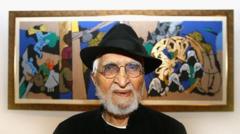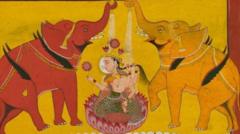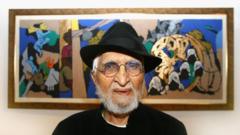In a significant legal move, the Delhi court permitted the seizure of two artworks by the prominent artist MF Husain, known for his provocative depictions of Hindu deities. This decision follows a complaint alleging that the paintings, displayed at the Delhi Art Gallery (DAG), were "offensive" and hurt religious sentiments. The complaint was lodged by lawyer Amita Sachdeva after she photographed the paintings which featured naked female figures with Hindu gods Ganesha and Hanuman.
The artwork was part of an exhibition titled "Husain: The Timeless Modernist," running from October 26 to December 14 at the DAG. Husain, who passed away in 2011, has long been a polarizing figure in Indian art, particularly after facing severe backlash for representing Hindu deities in nudity. The DAG has distanced itself from the legal proceedings and is pursuing legal counsel concerning the matter.
On December 10, Ms. Sachdeva visited the gallery with a police officer, only to find the paintings had been withdrawn. The gallery denied ever exhibiting the artworks in question, prompting Sachdeva to file a court petition to preserve CCTV footage from the dates of the alleged display.
During Monday’s hearing, the judge noted that the police had reviewed the footage and presented their findings. It was clarified that the exhibition only intended to present the original works of the late artist in a private space. Husain has been referred to as the "Picasso of India" and his works have fetched millions.
His career was riddled with controversies, including accusations of obscenity stemming from a nude portrayal in his painting "Mother India." Following outrage, he left India and lived in self-imposed exile. Previous legal efforts to prosecute Husain were dismissed by the Supreme Court in 2008, which highlighted concerns over a rising "new puritanism" in India regarding artistic freedom.
In a follow-up case, the Bombay High Court rebuked customs officials for seizing artworks by notable artists, reaffirming that nudity in art does not necessarily constitute obscenity. This ongoing situation underscores a contentious debate on artistic expression and religious sentiments in India.
The artwork was part of an exhibition titled "Husain: The Timeless Modernist," running from October 26 to December 14 at the DAG. Husain, who passed away in 2011, has long been a polarizing figure in Indian art, particularly after facing severe backlash for representing Hindu deities in nudity. The DAG has distanced itself from the legal proceedings and is pursuing legal counsel concerning the matter.
On December 10, Ms. Sachdeva visited the gallery with a police officer, only to find the paintings had been withdrawn. The gallery denied ever exhibiting the artworks in question, prompting Sachdeva to file a court petition to preserve CCTV footage from the dates of the alleged display.
During Monday’s hearing, the judge noted that the police had reviewed the footage and presented their findings. It was clarified that the exhibition only intended to present the original works of the late artist in a private space. Husain has been referred to as the "Picasso of India" and his works have fetched millions.
His career was riddled with controversies, including accusations of obscenity stemming from a nude portrayal in his painting "Mother India." Following outrage, he left India and lived in self-imposed exile. Previous legal efforts to prosecute Husain were dismissed by the Supreme Court in 2008, which highlighted concerns over a rising "new puritanism" in India regarding artistic freedom.
In a follow-up case, the Bombay High Court rebuked customs officials for seizing artworks by notable artists, reaffirming that nudity in art does not necessarily constitute obscenity. This ongoing situation underscores a contentious debate on artistic expression and religious sentiments in India.






















